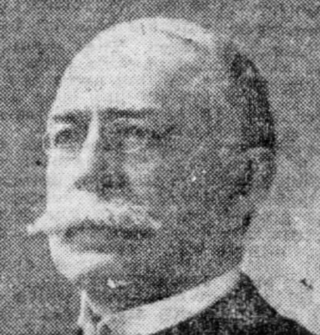Related Research Articles

Jacksonville is a city and the county seat of Morgan County, Illinois, United States. The population was 17,616 at the 2020 census, down from 19,446 in 2010. It is home to Illinois College, Illinois School for the Deaf, and the Illinois School for the Visually Impaired, and was formerly home to MacMurray College. Jacksonville is the principal city of the Jacksonville Micropolitan Statistical Area, which includes all of Morgan and Scott counties.

Timothy Dwight V was an American academic, educator, Congregational minister, and President of Yale University (1886–1898). During his years as the school's president, Yale's schools first organized as a university. His grandfather was Timothy Dwight IV, who served as President of Yale College ninety years before his grandson's tenure.

Rufus Choate was an American lawyer, orator, and Senator who represented Massachusetts as a member of the Whig Party. He is regarded as one of the greatest American lawyers of the 19th century, arguing over a thousand cases in a lifetime practice extending to virtually every branch of the law then recognized. Notably, he was one of the pioneers of the legal technique of arousing jury sympathy in tort cases. In one instance, he successfully won a record judgement of $22,500 for a badly injured widow, the most ever awarded to a plaintiff at the time.

Theodore Dwight Woolsey was an American academic, author and President of Yale College from 1846 through 1871.

Clinton Hart Merriam was an American zoologist, mammalogist, ornithologist, entomologist, ecologist, ethnographer, geographer, naturalist and physician. He was commonly known as the "father of mammalogy," a branch of zoology referring to the study of mammals.

Illinois College is a private liberal arts college in Jacksonville, Illinois. It is affiliated with the United Church of Christ and the Presbyterian Church (USA). It was the second college founded in Illinois but the first to grant a degree. It was founded in 1829 by the Yale Band, students from Yale College who traveled westward to found new colleges. It briefly served as the state's first medical school, from 1843 to 1848.

Manasseh Cutler was an American Congregational clergyman involved in the American Revolutionary War. He was influential in the passage of the Northwest Ordinance of 1787 and wrote the section prohibiting slavery in the Northwest Territory. Cutler was also a member of the United States House of Representatives. Cutler is "rightly entitled to be called 'The Father of Ohio University.'"

John Adams was an American educator noted for organizing several hundred Sunday schools. He was the 4th Principal of Phillips Academy. His life was celebrated by Dr. Oliver Wendell Holmes Sr. in his poem, "The School Boy", which was read at the centennial celebration of Phillips Academy in 1878, thus recalls him:
Uneasy lie the heads of all that rule — His most of all whose kingdom is a school.
Alfred Cowles Jr. was a director of the Chicago Tribune company for 48 years.

George Edgar Vincent was an American sociologist and university president.

Leonid Hurwicz was a Polish–American economist and mathematician, known for his work in game theory and mechanism design. He originated the concept of incentive compatibility, and showed how desired outcomes can be achieved by using incentive compatible mechanism design. Hurwicz shared the 2007 Nobel Memorial Prize in Economic Sciences for his seminal work on mechanism design. Hurwicz was one of the oldest Nobel Laureates, having received the prize at the age of 90.

John Haskell Hewitt was an American classical scholar and educator, notable for serving as acting president of Williams College from 1901 to 1902.

David Kinley was a Scotland-born economist who worked in the United States. He was head of the department of economics of the University of Illinois and later president of the University. As an economist, he was of the classical school, and his main interest was in money and banking. Administration gradually took up most of his time as his career progressed.
Brown's Business College was a chain of business colleges located in the Midwestern United States, started in Illinois in the 1870s by George W. Brown (1845-1918) of Jacksonville, Illinois. He grew the chain to at least 29 locations during the 1910s. Though most of the colleges had closed or changed names by the 1960s, at least one location continued under the same name into the early 1990s.

Edward Cowles, an American psychiatrist, was the medical superintendent of the McLean Hospital in Massachusetts from 1879 to 1903. He was among the first hospital superintendents to advocate for hospital functions that encompassed patient treatment, research, and teaching.

William Petit Trowbridge was a mechanical engineer, military officer, and naturalist. He was one of the first mechanical engineers on the faculties of the University of Michigan, the Sheffield Scientific School of Yale, and the Columbia School of Mines. He had a brief military career after graduating from West Point and later served as Adjutant General for the State of Connecticut from 1873 to 1876. During his career as a surveyor on the American Pacific coast he collected thousands of animal specimens, several of which now bear his name.

Andrew Russel was a Republican politician and banker, who twice served as Illinois Treasurer and later as Illinois Auditor of Public Accounts (1917–1925), before being convicted along with his partner of illegal banking practices in 1932 and dying in prison.
Henry Cowles was an American theological scholar and abolitionist.

Julian Monson Sturtevant was an American author and educator. He was a founding professor and second president of Illinois College.
References
- ↑ Betty Carlson Kay; Gary Jack Barwick (1999). Jacksonville, Illinois: The Traditions Continue. Arcadia Publishing. p. 36. ISBN 978-0-7385-0232-8.
- ↑ "The Council of Independent Colleges: Historic Campus Architecture Project". hcap.artstor.org. Retrieved 2016-01-18.